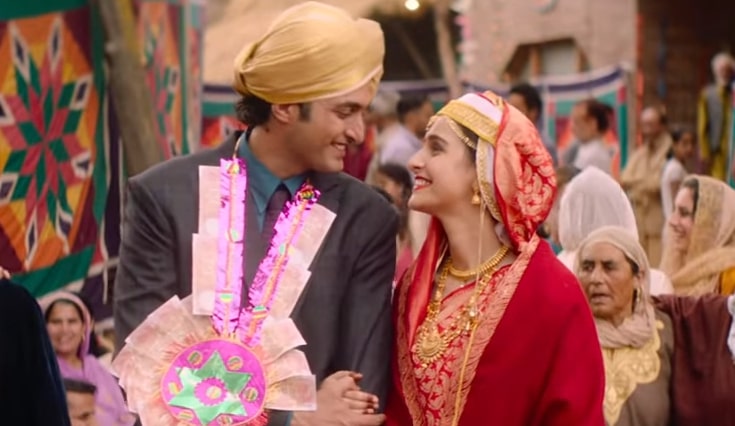The exodus of Kashmiri Hindus from their motherland in the early 90s is one of the most shameful incidents to have happened in the history of independent India. According to a report published by a government agency in 2016, out of the lakhs of Hindus living there in the 90s, only a few thousand (in the range of 2,000 – 3,000) remain in the valley. Till date, political parties have assured support to these displaced families and promised them to help them get back to their motherland but no significant step has been taken in this regard. Vidhu Vinod Chopra’s directorial feature ‘Shikara: The Untold Story Of Kashmiri Pandits’ is the first major motion picture which is based on this subject.
It’s the late 80s and Kashmir is a valley far removed from the disturbances and the ugliness it has engulfed today on account of radicalisation and other issues. It is that beautiful, peaceful valley which poets have written about. Shiv Kumar Dhar (Aadil Khan) and Shanti Sapru (Sadia) are residents of Kashmir who meet and instantly fall in love. They get married, build a new house and dream of a prosperous life in the valley which have called their home all their lives. All their dreams fall apart when they are forced to leave Kashmir and settle in a refugee camp. As Shiv prepares himself for a new job in Punjab University and rebuild their lives again, Shanti tells him if they leave this place, the children, who are being taught by Shiv in the small makeshift school, will be deprived of education. Shiv sees the wisdom in Shanti’s words and decided to stay back in that area where now small cottages have been built for the refugees to live in.
‘Shikara: The Untold Story Of Kashmiri Pandits’ was earlier titled ‘Love Letters From Kashmir’ and Vidhu Vinod Chopra has repeatedly stated in his interviews that he wanted to make a romantic saga set against the backdrop of the troubled times in Kashmir. He has succeeded wonderfully in his endeavour of doing the same. The film tells the story of Shanti and Shiv and how they manoeuvre their way through the rough times they face owing to their exodus from the valley and how it shapes their relationship and them as individuals. Without giving away any information that could act as spoiler, I would like to state that the penultimate moments of the film left me with a lump in my throat. A certain section of the audience might feel that the film does not do complete justice to the subject matter (exodus of Kashmiri Hindus) as Chopra talks about the incident and its aftermath in a very subtle manner and not in an overtly aggressive or sensationalist fashion which, going by the current political fervour in the nation, some people would have hoped him to. You see some characters/people who were behind what happened in the valley and then, you see shadows (when Shiv and Sadia’s house is attacked), conversations and visuals which sufficiently portray what Kashmiri Hindus went through and how they continue to suffer.
Music has always been one of the highlights in the films directed by Vidhu Vinod Chopra. The background score (A. R Rahman and Qutub-E-Kripa) is very effective. Though the album has as many as six songs (and a dialogue track), the two songs which one gets to hear properly in the film are ‘Mar Jaayein Hum’ (music: Sandesh Shandilya; lyrics: Irshad Kamil) and ‘Shukrana Gul Khile’ (music: Abhay Rustum Sopori; lyrics: Raqueeb Alam). ‘Mar Jaayein Hum’ is a deeply immersive melody which arrives at two emotionally arousing moments in the film and stay with you long after you are done watching the film. What also stays with you is the wonderful frames put together by Rangarjan Ramabadran. The screenplay (Vidhu Vinod Chopra, Abhijat Joshi and Rahul Pandita) has been written very sensitively and unfolds seamlessly on the screen. Chopra, apart from co-writing and directing the film, has also edited it and has done a very good job at it too.
Debutantes Sadia and Aadil Khan leave a very strong impression with their performances. In their very first film, they get to play complex, difficult parts. The fact they come out with flying colours while playing their respective character shows how confident they are as performers. Aadil has a deep baritone and is very good with delivering his dialogues. The rest of the actors have been cast appropriately too. Priyanshu Chatterjee and the actor playing Aadil’s friend who sides up with the fundamentalist leave an impression.
Vidhu Vinod Chopra, despite lack of commercial success as a director, is regarded as one of the finest filmmakers in the country and rightfully so. He had an eye for detailing which was evident right from the days he started out with films like ‘Sazaye Maut’ and ‘Khamosh’. After all these year, one is happy to confirm that his artistic sensibilities are firmly in place, and with ‘Shikara: The Untold Story Of Kashmiri Pandits’, one hopes that he gets a bonafide success to his credit as a director too.

